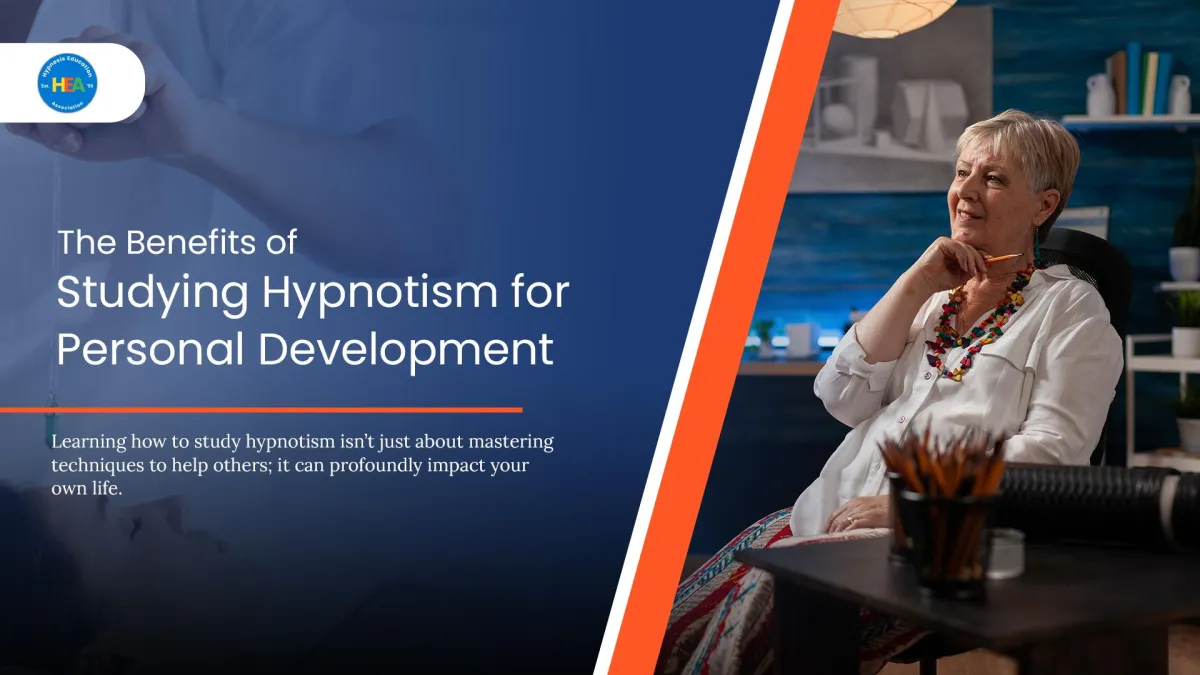
Benefits of Studying Hypnotism for Personal Growth and Development
The Benefits of Studying Hypnotism for Personal Development
Learning how to study hypnotism isn’t just about mastering techniques to help others; it can profoundly impact your own life. Hypnotism, when understood and practiced, offers tools that enhance self-awareness, emotional intelligence, and personal growth. In this blog, we’ll dive into the many ways hypnotism can aid personal development, from increasing confidence to improving focus.
1. Enhanced Self-Awareness
One of the primary benefits of studying hypnotism is the deepening of self-awareness. Hypnotism encourages practitioners to engage in introspective exercises, often guiding them to identify their own thoughts, patterns, and behaviors.
As you learn how to study hypnotism, you’ll gain insights into why certain beliefs or habits have taken hold. This understanding doesn’t just benefit those you may hypnotize in the future; it enables you to reflect on your own mindset and reframe limiting beliefs that may have held you back.
2. Improved Focus and Concentration
Hypnotism requires intense concentration, not just from the person being hypnotized but also from the hypnotist. When learning how to study hypnotism, you’re training your mind to remain focused and undistracted, honing your ability to concentrate.
This increased focus can translate to other areas of life, such as work or study. By practicing the skills needed in hypnotism, you’re also practicing the art of sustained attention. Over time, this focus becomes second nature, helping you stay on task and manage distractions more effectively.
3. Heightened Emotional Intelligence
Studying hypnotism requires a keen understanding of human emotions and an ability to recognize subtle cues in others. This skill is essential for connecting with the person you’re hypnotizing, but it also boosts your emotional intelligence overall.
Emotional intelligence is the ability to understand, manage, and express your own emotions while empathizing with others. As you dive deeper into how to study hypnotism, you’ll find yourself becoming more attuned to emotional nuances in daily interactions. This heightened awareness can lead to stronger personal and professional relationships, as you’ll be better equipped to respond to others’ emotions effectively.
4. Greater Confidence and Self-Esteem
Many people report feeling more confident after studying hypnotism. Learning how to study hypnotism involves developing strong communication skills, as well as techniques for guiding someone through a hypnotic state. The process naturally builds self-assurance.
As you continue to learn and practice hypnotism, you’ll find that the skills you develop enhance your self-esteem. Knowing you have the ability to help others manage their stress or improve their mindset can be incredibly empowering. This confidence often spills over into other areas of life, creating a cycle of positive self-regard and accomplishment.
5. Effective Stress Management
Life’s challenges can lead to stress, but hypnotism provides practical tools for managing it. Many hypnotic techniques focus on relaxation and mental clarity, which can be helpful both for yourself and others.
Through learning how to study hypnotism, you’ll discover methods to calm the mind, reduce tension, and approach stressful situations with a clear head. For instance, self-hypnosis is a technique that can be learned to manage anxiety, promote relaxation, and even improve sleep. By incorporating these practices, you’ll find that everyday stressors become more manageable.
6. Improved Communication Skills
Communication is a core aspect of hypnotism. Hypnotists need to convey instructions clearly and maintain a soothing tone, creating an environment that fosters trust and comfort. Learning how to study hypnotism naturally involves practicing and refining these communication skills.
Whether you’re giving a presentation, negotiating, or simply engaging in conversation, effective communication can transform interactions. As you hone these skills through hypnotism, you’ll find it easier to articulate your thoughts, read body language, and communicate with empathy. These skills are invaluable in both personal and professional relationships.
7. Increased Resilience and Adaptability
Studying hypnotism requires patience, dedication, and adaptability. Each session can vary, and you must be prepared to respond to different reactions and adapt your approach accordingly.
As you study how to learn hypnotism, this flexibility becomes a core skill. In life, resilience and adaptability are essential. Hypnotism encourages these traits, as you’re continuously learning to read situations, remain calm under pressure, and pivot strategies as needed. This resilience can help you tackle challenges with a more adaptable mindset, viewing obstacles as opportunities for growth.
8. Deepened Mindfulness and Presence
At its heart, hypnotism is about guiding oneself or others into a state of relaxed awareness. Hypnotism techniques often encourage mindfulness and presence, helping both the hypnotist and the person being hypnotized to stay in the moment and let go of distractions.
Learning how to study hypnotism can be incredibly beneficial for fostering mindfulness in your own life. Regular practice allows you to tune into the present, reducing stress and anxiety by shifting your focus away from worries about the past or future. This presence enhances overall well-being and helps you stay grounded even in high-stress situations.
9. Enhanced Problem-Solving Skills
Hypnotism involves understanding complex emotional and mental processes, which can improve your problem-solving abilities. When you study how to learn hypnotism, you learn to approach situations from different perspectives, analyzing what might be affecting someone’s mindset or behavior.
This analytical approach can be beneficial in other areas of life, as it teaches you to look at problems objectively, considering various solutions before making a decision. Hypnotism encourages creative thinking, which can make you a more effective problem-solver in personal and professional settings.
10. Empathy and Compassion Development
Lastly, hypnotism emphasizes understanding and empathy. Practicing hypnotism is essentially an exercise in compassion, as you strive to help someone relax, focus, or overcome a particular hurdle.
As you learn how to study hypnotism, you’ll likely find yourself becoming more empathetic and patient in everyday life. This empathy is invaluable, helping you build stronger connections and approach others with understanding. In a world where empathy is often in short supply, studying hypnotism can be a powerful way to cultivate a deeper sense of compassion.
Ready to Begin Your Journey in Hypnotism?
The benefits of studying hypnotism extend far beyond guiding someone into a relaxed state. From building confidence to enhancing communication, studying hypnotism for personal growth can be transformative. By learning how to study hypnotism, you’re investing in skills that improve self-awareness, resilience, and emotional intelligence—qualities that benefit all aspects of life.
Take the First Step Today: If you’re ready to experience these benefits firsthand, consider joining the Hypnosis Education Association. Through their resources and community, you can start your journey with confidence, guided by experienced professionals and supported by a network of like-minded individuals. Join us today and unlock your potential in the fascinating field of hypnotism!

